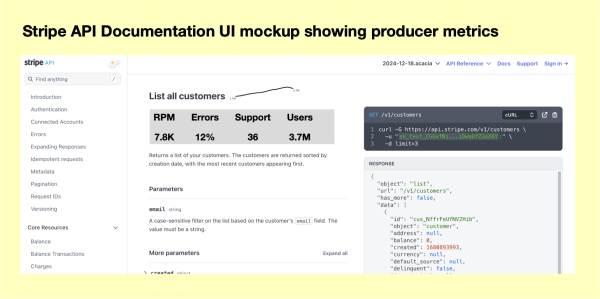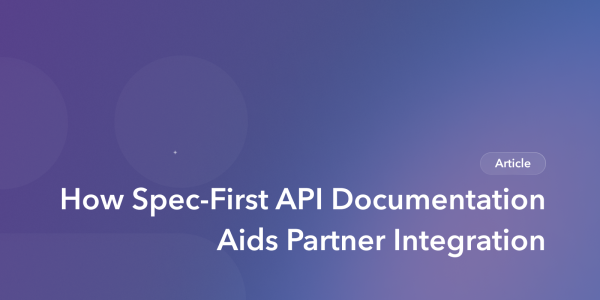Suche
Beiträge, die mit apidocumentation getaggt sind
Here is some more context to help you decide on an approach and get started."
https://gist.github.com/briandominick/3ffab6be460fbde799aa34e0a42a4299
#API #APIs #APIDesign #REST #APIDocumentation #OpenAPI #DocsAsCode #TechnicalWriting #TechnicalCommunication

API Documentation Decision Matrix
API Documentation Decision Matrix. GitHub Gist: instantly share code, notes, and snippets.Gist
The reason this isn’t caught is simple: We’re not expecting it.
For our testing, the call is made and we get results. We may even spot check some of them. But generally, results aren’t examined that closely. For instance, how often do you so carefully examine a returned list of 50 or 100 items? You check may check that the objects are complete but not that the list conforms to the search criteria.
The reason this happens is because of an intentional behavior on the server. This behavior is called Lenient Handling or Strict Handling."
https://robertdelwood.medium.com/understanding-query-parameter-handling-in-rest-calls-1821e0c3fa8c
#APIs #RESTAPIs #Rest #APITesting #APIDesign #APIDocumentation #SoftwareDevelopment
#APIs #APIDocumentation #Markdown #TechnicalWriting #Git #DocsAsCode
https://apichangelog.substack.com/p/three-elements-of-a-good-api-readme

Three Elements of a Good API README
Sometimes, offering an API README is enough. What are the elements that make it good?Bruno Pedro (The API Changelog)
https://www.apimatic.io/blog/how-to-design-a-quick-start-guide-for-your-api
#TechnicalWriting #APIs #APIDocumentation #SoftwareDocumentation #GettingStarted #Tutorials #SoftwareDevelopment #DE #DeveloperExperience

How to Design a Quick Start Guide for Your API
Learn how Quick Start Guides help developers, what makes a good quick start guide and an example of a quick startSid Maestre (APIMatic Limited)
Being able to see the metrics you care about right near the documentation for each part of your API feels refreshing. You could, for instance, be looking at the reference of one operation and immediately see its usage trend, the error rate, the number of active consumers in the last hour, and so on. What's more, some of the information visible only to you could also be actionable. You could, for instance, open the pending support requests to see what the top complaints are. Or, you could immediately check why there's such a percentage of errors on one single operation.
While most information would be restricted to you, the producer, I argue that some things could even be openly shared with your API consumers. Imagine being a consumer and seeing a list of "popular" API operations right on the documentation. Or understanding if a certain operation is producing a high error rate. All these things could be easily available in the API documentation."
https://apichangelog.substack.com/p/producer-oriented-api-documentation
#TechnicalWriting #APIs #APIDocumentation #SoftwareDocumentation #APIMetrics #APIAnalytics #SoftwareDevelopment

Producer-Oriented API Documentation
If API documentation is so important to consumers, how can it also help producers succeed?Bruno Pedro (The API Changelog)
All that falls apart when it comes to writing, of any type, and specifically API documentation writers. CEOs, who I love to vilify for this reason, generally don’t understand technical writing and technical writers. To them, and that attitude often trickles down the table of organization, see copy, marketing, content, and technical writing as the same and interchangeable. I believe this causes the low pay rates, because we’re seen as a commodity, going at market rate. A doctor with 15 years of experience is treated as an expert. A writer with 15 years of experience competes in the marketplace with junior writers. A shame for sure. I digress some but that needed to be pointed out.
There is information to be mined from bad job descriptions, if you know what to look for and know how to use that information."
https://robertdelwood.medium.com/reading-api-documentation-writers-job-descriptions-92124e5d9008
#TechnicalWriting #APIDocumentation #APIs #SoftwareDocumentation #SoftwareDevelopment
In the end, the business effects of specification-driven development are manifold. Whether you're building RESTful, GraphQL, or event-driven partner services, having reliable API documentation is important to compete in the digital economy. This consistency equates to a better partner experience, leading to stickier partners and less customer churn. By enabling smoother integrations and reducing frustration, spec-first documentation directly contributes to partner retention and loyalty, which ultimately drives revenue growth."
https://bump.sh/blog/how-spec-first-api-documentation-aids-partner-integration
#APIs #APIDocumentation #TechnicalWriting #SpecFirst #SoftwareDocumentation #Docs #DeveloperExperience #DocsAsCode

How Spec-First API Documentation Aids Partner Integration · Bump.sh
Partner APIs are far more common than public-facing APIs. Yet, inaccessible documentation for these APIs is often a big barrier to partner success.bump.sh
It takes up valuable screen real estate (the right corner above the fold). Writers need to optimize the developer experience, even to the point of minimizing eye movements. Make it easy to find details. That space could be used more productively.
We “should know” but we don’t. This segues into the real reason. It demonstrates that writers don’t know the developer experience. Let’s be blunt. We’re delivering documentation suites that have not been tested properly, calls that are unlikely to have been tested, and tools developers don’t use. Not understanding these issues is the fundamental reason writers also need developer experience. Writers simply can’t empathize with own audiences, which means we supplying developers with inadequate and incomplete tools and documentation. This is a real concern.
This is not a condemnation. Quite the opposite. API documentation writers need to empathize with developers. Writers do this by treating this as a craft, learn a little about development each day, and move slowly along the experience spectrum towards the developer’s end. Learn a language. It doesn’t matter which one. Java, JavaScript, to DOS batch commands, UNIX command line programming, Word macros, Python, or even AutoHotKey*. All of these have programming concepts and that’s what matters. Learn about them, which requires using an API guide, craft statements, and debug them is at the heart of the matter."
https://robertdelwood.medium.com/why-i-dont-like-try-it-f44112ed1b6d
#APIs #APIDocumentation #SoftwareDevelopment #TechnicalWriting
